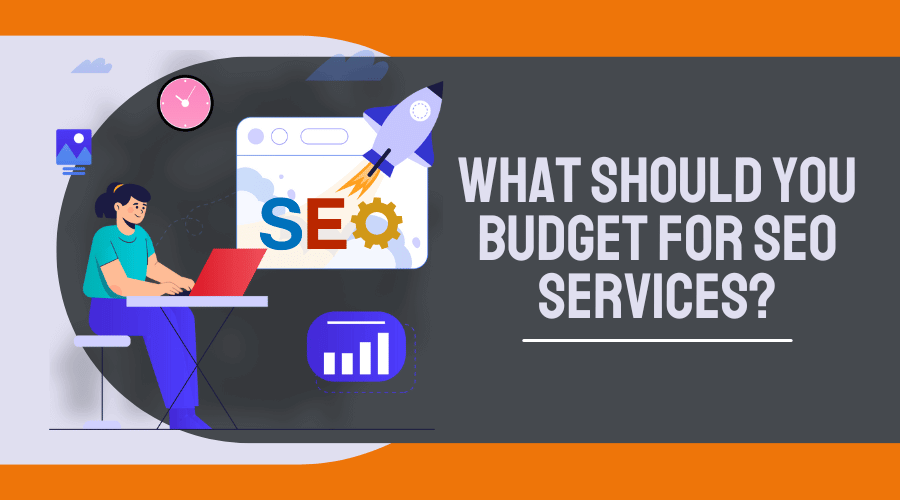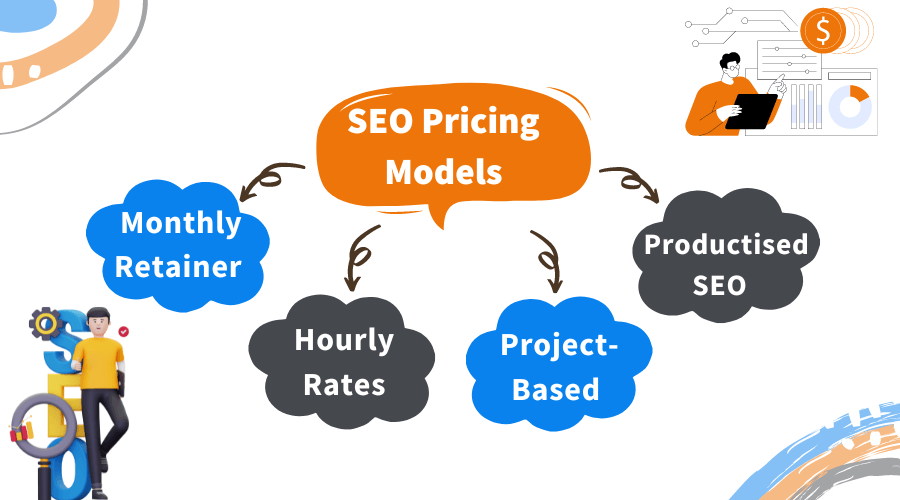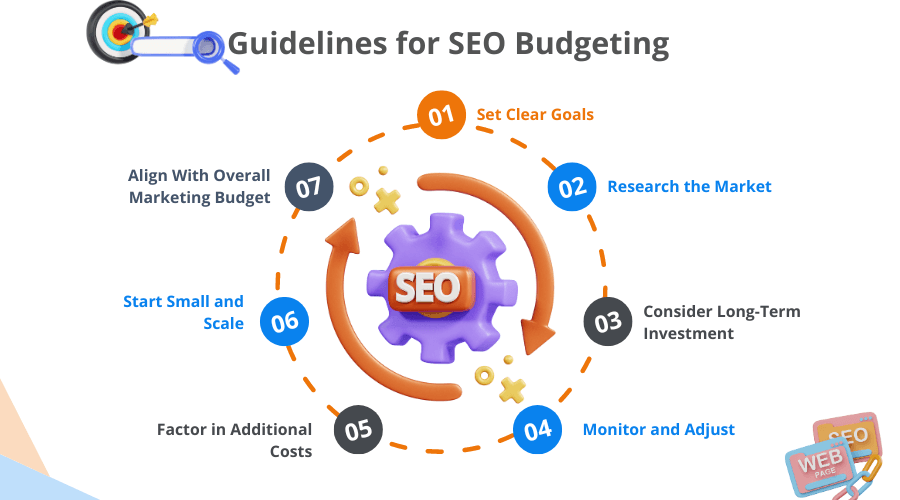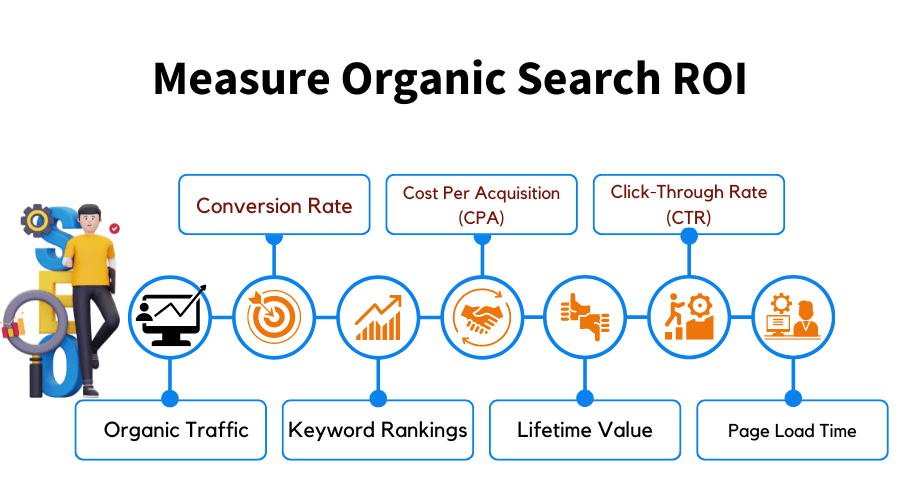Luke founded Loop Digital in 2014 with the aim of bringing a fresh and incomparable approach to a crowded digital marketplace. Providing bespoke end-to-end digital marketing solutions for a variety of different businesses in a number of unique sectors and industries. Luke ensures that every decision made at Loop Digital is guided by core values, knowledge, and expertise to achieve tangible results for all client-partners.
Posted on 24/09/2024 by Luke Kennedy
What Should You Budget for SEO Services?

It is quite obvious now, that, having a strong online presence is no longer optional — it’s essential. Any robust digital strategy lies in Search Engine Optimisation or SEO. But for many business owners, particularly those just dipping their toes into the vast ocean of digital marketing, a burning question remains: “How much should I pay an agency for SEO?”
It’s a brilliant question and one that deserves a thorough answer. After all, your marketing budget isn’t unlimited, and you want to ensure you’re getting the best out of your investment. So, grab a cuppa, and let’s dive into the details of SEO pricing, shall we?
As we navigate through 2024, the importance of SEO has never been more apparent. With the digital marketplace becoming increasingly crowded, standing out from the competition is crucial. Whether you’re a small local business or a large multinational corporation, having a solid SEO strategy can make the difference between thriving and merely surviving in the online world.
But before we delve into the breakdown of SEO pricing, let’s take a moment to understand what SEO is and why it’s become such a vital component of digital marketing.
What is SEO?
Search Engine Optimisation, or SEO, is the practice of optimising your website to rank higher in search engine results pages (SERPs). When someone types a query into Google (or Bing, if you’re exploring new fields), SEO helps ensure that your website pops up as a relevant result.
Now, you might be thinking, “That sounds simple enough. Why can’t I just do it myself?” Well, you could — but SEO is a bit like an iceberg. What you see on the surface is just a fraction of what’s going on underneath. A comprehensive SEO strategy involves:
- On-page SEO: This on-page SEO includes optimising your website’s content, structure, and HTML elements (like title tags and meta descriptions) to make it more search-engine friendly.
- Off-page SEO: This focuses on building your website’s authority through tactics like link-building and social media marketing.
- Technical SEO: This involves optimising the backend of your website, ensuring it’s fast, mobile-friendly, and easy for search engines to crawl and index.
- Keyword research: Identifying the terms and phrases your target audience is using to search for products or services like yours.
- Content creation: Developing high-quality, relevant content that addresses your audience’s needs and incorporates your target keywords.
- Link building: Acquiring high-quality backlinks from reputable websites to boost your site’s authority.
- Local SEO: Optimising your online presence to attract more business from relevant local searches.
Each of these areas requires specific expertise and ongoing effort. That’s why many businesses choose to partner with an SEO marketing agency to handle their optimisation needs.
Why is SEO Expensive?
But why is SEO so expensive? Several factors contribute to the cost:
- Complexity: SEO is not a one-time task but an ongoing process that requires continuous effort, monitoring, and adjustments. Search engine algorithms are constantly evolving, and staying ahead of these changes requires expertise and dedication.
- Time-Intensive: Effective SEO strategies require significant time investment for research, content creation, and link building. It’s not uncommon for agencies to spend 20+ hours per month on a single client’s SEO efforts.
- Expertise Required: Skilled SEO professionals command higher fees due to their expertise and experience in the field. The best SEO agencies invest heavily in training and staying up-to-date with the latest SEO trends and best practices.
- Competition: In highly competitive industries, more resources are needed to achieve and maintain high rankings, driving up costs.
- Tools and Resources: Agencies often invest in advanced SEO tools and software, which can be expensive. These costs are typically passed on to clients.
Why do Businesses need to Invest in SEO?
You might be wondering, “Is SEO really worth the investment?” The short answer is a resounding yes! Here’s why:
- Increased Visibility: With over 3.5 billion searches on Google every day, having a strong SEO strategy can significantly boost your visibility to potential customers. The higher you rank in search results, the more likely people are to click on your website.
- Cost-Effectiveness: Compared to traditional marketing methods, SEO often provides a better return on investment. According to research, SEO leads have a 14.6% close rate, while outbound leads (like direct mail or print advertising) have a meagre 1.7% close rate. When considering your SEO marketing budget, keep in mind that while the initial investment might seem high, the long-term benefits often outweigh the costs.
- Long-Term Results: Unlike paid advertising, which stops generating traffic the moment you stop paying, SEO can provide long-term benefits. A well-optimised website can continue to attract organic traffic for months or even years after the initial investment.
- Improved User Experience: Good SEO practices often go hand-in-hand with a better user experience. A well-structured, fast-loading, and mobile-friendly site not only ranks better but also keeps visitors happy and engaged, leading to higher conversion rates.
- Competitive Advantage: In today’s competitive market, businesses that invest in SEO are more likely to outperform their competitors. According to a study, it is stated that 68% of online experiences begin with a search engine, highlighting the importance of being visible in search results.
- Credibility and Trust: Websites that appear at the top of search results are often perceived as more credible and trustworthy by users. By investing in SEO, you’re not just improving your rankings, but also building trust with your potential customers.
How Much Does SEO Cost?
Now, let’s get to the heart of the matter: SEO agency fees. The truth is, there’s no one-size-fits-all answer. SEO costs can vary significantly based on several factors, including the agency’s experience, the services offered, and the complexity of your project.
According to industry research, the average costs for SEO services in the UK typically range from £500 to £8,000 per month, based on the services chosen. That’s quite a range, isn’t it? But it is also important to note that these are average figures, and the actual cost can vary based on your specific needs and the agency you choose.
What is the most Common Budget Range for SEO Campaigns?
If you’re just starting out, you might be wondering what a typical SEO budget looks like. While it can vary widely depending on your industry and goals, the most common budget range for SEO campaigns in the UK typically falls between £1,500 and £5,000 per month.
Businesses with smaller budgets may spend around £500 to £1,500 for basic services, while larger enterprises might invest £5,000 to £8,000 or more for comprehensive SEO strategies. Remember, when setting your SEO marketing budget, it’s important to consider it as an investment rather than an expense.
SEO Pricing Models
When it comes to SEO pricing models, there’s no shortage of options. Understanding these different models can help you make an informed decision about which approach best suits your business needs and budget. Let’s explore the most common SEO pricing models in detail

Monthly Retainer Pricing Model
The monthly retainer model is the most common pricing structure in the SEO industry, offering consistent and proactive support tailored to a business’s evolving needs.
Depending on the agency’s reputation, experience, and the comprehensiveness of the services provided, retainers can range from £1,500 to £8,000 per month. This model is particularly advantageous for businesses seeking to build and maintain a robust SEO strategy over time.
The ongoing relationship allows the agency to continuously optimise the site, stay ahead of algorithm changes, and adapt the strategy based on the latest industry trends and business goals.
Hourly Rates Pricing Model
Some SEO professionals, particularly freelancers and smaller agencies, prefer to charge by the hour, with rates ranging from £75 to £400.
This model offers flexibility, making it suitable for businesses with specific, short-term needs or for those who want to test the waters before committing to a more extensive agreement. A survey by Ahrefs highlights that approximately 42% of SEOs charge between £200 to £800 per month, reflecting the varied nature of hourly pricing.
Hourly rates can be an economical option for businesses needing occasional advice or small-scale optimisations.
Project-Based Pricing Model
For businesses with distinct goals, such as a comprehensive SEO audit, a one-time link-building campaign, or a website redesign, project-based pricing provides clear and upfront costs.
These projects can range from £1,000 to £20,000, depending on their complexity and the expertise of the agency. This pricing model is ideal for businesses looking to address specific issues or enhance particular aspects of their SEO without committing to an ongoing retainer.
It offers clarity on deliverables and costs, making it easier for businesses to budget and manage their SEO investments effectively.
Productised SEO Delivery Pricing
Productised SEO delivery pricing offers fixed-price packages for specific services, like keyword research, content creation, or link building, starting at around £500.
This model allows businesses to choose tailored services that suit their budget and needs, providing clarity on what’s included. It’s an accessible option for those new to SEO or with particular requirements, offering a straightforward way to enhance their online presence without a long-term commitment.
However, it may lack the customisation of other models and might not be suitable for businesses needing a comprehensive SEO strategy, as it focuses on individual components rather than an integrated approach.
Factors Influencing SEO Pricing
When you’re shopping around for SEO services, you’ll likely notice that prices can vary significantly from one agency to another. Several factors influence these price differences:
- Agency Experience and Reputation: Established agencies with a proven track record typically charge higher rates due to their expertise and success stories.
- Scope of Services Offered: Agencies that provide comprehensive services, including technical SEO, content marketing, and analytics, will likely charge more than those offering basic services. A full-service SEO marketing agency might have higher fees, but it can often provide more value by addressing all aspects of your digital marketing strategy.
- Industry Competitiveness: Businesses in competitive industries may need to invest more in SEO to achieve and maintain high rankings. For example, SEO for a local bakery might be less expensive than SEO for a national law firm or e-commerce site.
- Project Scope and Duration: Larger projects requiring more resources and time will naturally incur higher costs. A complete website overhaul, for instance, will cost more than a basic SEO audit.
- Current State of Your Website: If your website needs significant technical improvements or has existing penalties, more work will be required, potentially increasing costs.
- Your Goals and Timeline: Aggressive goals or tight timelines may require more resources and thus higher investment.
SEO Budgeting
When it comes to budgeting for SEO, it’s important to approach it as a long-term investment rather than a quick fix. Here are some guidelines for effective SEO budgeting:

- Set Clear Goals: Define what you want to achieve with your SEO efforts. Are you looking to increase traffic, improve conversions, or enhance brand visibility? Your goals will influence your budget and the strategies employed.
- Research the Market: Understand the average costs of SEO services in your industry and region to set realistic expectations. Remember, the best SEO agency in London might charge more, but they could also deliver better results.
- Consider Long-Term Investment: SEO is a long-term strategy, so be prepared to invest consistently over time to see significant results. It’s not uncommon for it to take 3-6 months before you start seeing substantial improvements.
- Monitor and Adjust: Regularly review your SEO performance and adjust your budget as needed based on results and changing market conditions. A good agency will provide regular reports and be willing to discuss strategy adjustments.
- Factor in Additional Costs: Remember that effective SEO often involves more than just the agency’s fees. You might need to budget for content creation, web development changes, or other related expenses.
- Start Small and Scale: If you’re new to SEO, consider starting with a smaller budget and scaling up as you see results. This approach allows you to test the waters without overcommitting financially.
- Align with Overall Marketing Budget: Your SEO budget should align with your overall digital marketing strategy. As a general rule, many businesses allocate 10-50% of their total marketing budget to SEO, depending on their goals and industry.
What to Expect?
When setting your SEO marketing budget, it’s also important to have realistic expectations about what you’ll get for your investment
| Basic SEO Services | Mid-Range SEO Services | High-End SEO Services |
| Generally ranges from £500 – £1,500/month. At this level, you can expect fundamental on-page optimisation, basic keyword research, and perhaps some local SEO efforts. This might be suitable for small local businesses or those just starting with SEO. | Ranges from £1,500 – £5,000/month. This includes more comprehensive on-page and off-page optimisation, content creation, link building, and regular reporting. It’s suitable for medium-sized businesses or those in moderately competitive industries. | Starts from £5,000 and extends beyond £8,000+/month. At this level, you can expect a full-service approach with comprehensive on-page and off-page optimisation, advanced technical SEO, competitive analysis, and detailed reporting. This is typically suitable for large businesses, e-commerce sites, or those in highly competitive industries. |
Remember, these are general guidelines, and the actual services and results can vary depending on the agency and your specific needs.
SEO Cost Calculator
Many agencies offer SEO cost calculators to help businesses estimate their SEO expenses based on their specific needs. These tools typically consider factors such as:
- The size of the website
- The competitiveness of the industry
- The desired level of service (basic, intermediate, or advanced)
- Geographic targeting (local, national, or international)
- Current website performance
By entering relevant information, businesses can receive a tailored estimate that aligns with their goals and budget. However, remember that these calculators provide rough estimates, and it’s always best to discuss your specific needs with an agency for a more accurate quote.
While we can’t provide a specific calculator here, here’s a simplified framework to help you estimate your SEO budget:
- Determine your goals: Are you looking for local, national, or international visibility?
- Assess your competition: How competitive is your industry in search results?
- Evaluate your current SEO status: Is your website already optimised, or are you starting from scratch?
- Consider your timeline: How quickly do you need to see results?
Based on these factors, you can place yourself in one of the budget ranges we discussed earlier and adjust as needed.
How to Measure Organic Search (SEO) ROI
Investing in SEO is all good, but how do you know if you’re getting a good return on your investment? Measuring the ROI of your SEO efforts is crucial for understanding the effectiveness of your strategy and justifying your SEO marketing budget. Here are some key performance indicators (KPIs) to track

- Organic Traffic: Monitor the volume of traffic coming from search engines to assess the impact of your SEO efforts. Tools like Google Analytics can provide detailed insights into your organic traffic trends.
- Conversion Rate: Track the percentage of visitors who complete desired actions (e.g., purchases, sign-ups) to evaluate the effectiveness of your SEO in driving valuable traffic. Remember, it’s not just about getting more traffic—it’s about getting the right traffic.
- Keyword Rankings: Regularly check your rankings for target keywords to gauge improvements and areas for further optimisation. While rankings aren’t everything, they’re a good indicator of your SEO progress.
- Cost Per Acquisition (CPA): Calculate the cost of acquiring a customer through SEO efforts to determine the overall efficiency of your strategy. Compare this to your CPA from other marketing channels to see how SEO stacks up.
- Lifetime Value (LTV): Consider the long-term value of customers acquired through organic search to assess the true ROI of your SEO investment. Customers who find you through organic search often have higher LTV than those from paid channels.
- Organic Click-Through Rate (CTR): This measures the percentage of people who click on your website in the search results. A higher CTR can indicate that your meta titles and descriptions are effective.
- Page Load Time: While not directly tied to ROI, faster-loading pages can improve user experience and potentially lead to higher conversions.
To calculate your SEO ROI, use this simple formula:
ROI = (Value of Conversions – Cost of SEO)/ Cost of SEO
For example, if your SEO efforts cost £5,000 per month and generate £20,000 in revenue, your ROI would be:
ROI = (20,000 – 5,000) / 5,000 = 3 or 300%
However, calculating the average ROI for SEO can be challenging due to the long-term nature of SEO and the many variables involved. Some studies suggest that the average ROI on SEO can range from 5:1 to 12:1, meaning for every pound spent, businesses see a return of £5 to £12.
Remember, ROI can take time to manifest in SEO. It’s very common for businesses to see minimal returns in the first few months, with ROI increasing significantly over time as their organic visibility improves.
Success Stories from Loop Digital
At Loop Digital, we’re passionate about crafting SEO strategies that meet our client’s needs and deliver impressive results. Here are two success stories that showcase our approach, the challenges our clients faced, and the fantastic outcomes we achieved together. To illustrate the potential impact of a well-executed SEO strategy, let’s look at a couple of success stories:
Cleaning equipment business visibility has grown using SEO tactics with SpaceVac
Spacevac, a cleaning equipment business, utilised targeted SEO strategies to improve its online visibility. By optimising its website and implementing a content marketing plan, Spacevac saw a 60% increase in organic traffic, online visibility and a substantial rise in sales.
Our SEO strategy included
- Keyword research to identify high-value, low-competition terms
- Creating product-focused content to target specific customer needs
- Improving website speed and mobile responsiveness
The result was not just an increase in traffic, but a significant boost in qualified leads and online sales, proving that a well-executed SEO strategy can have a direct impact on the bottom line.
SEO strategy implemented for solicitors with BP Collins
BP Collins, a law firm, implemented a comprehensive SEO strategy that resulted in significant improvements in organic traffic and lead generation. By focusing on keyword optimisation, content marketing, and local SEO, BP Collins achieved a 40% increase in organic traffic within six months.
Key strategies included:
- Optimising for local search terms
- Creating in-depth, authoritative content on legal topics
- Improving website structure and internal linking
The result? Not only did BP Collins see a surge in organic traffic, but they also experienced a substantial increase in quality leads, demonstrating the power of targeted SEO efforts. Their organic traffic doubled in just 6 months.
Boost Your Business SEO Growth with Loop Digital
Now that we’ve explored the intricacies of SEO pricing and strategy, you may be considering your next move. At Loop Digital, we’re here to help you elevate your SEO performance with tailored services designed to meet a wide range of needs.
As one of the leading SEO agencies in London, we provide comprehensive solutions that extend beyond SEO. Our services include:
- Search Engine Optimisation (SEO)
- Pay-Per-Click Advertising (PPC)
- Marketing Consultancy
- Conversion Rate Optimisation (CRO)
- Social Media Marketing (SMM)
- Web Design & Development
Our holistic approach ensures that your digital marketing efforts are cohesive, driving results across all channels. With a dedicated team of experts, Loop Digital can guide you through the complexities of SEO, helping you achieve your digital marketing goals.
As we’ve discussed in this guide, understanding SEO pricing involves recognising the various factors that influence costs, the different pricing models available, and the potential return on investment. When planning your SEO budget, keep the following in mind:
- SEO is a long-term investment, not a quick fix.
- Focus on value and potential ROI, rather than opting for the cheapest option.
- Cheap SEO services can be damaging and may result in Google penalties, which could significantly harm your online visibility and reputation.
- Furthermore, poor quality SEO tactics and planning, like keyword stuffing or unnatural link-building, can result in penalties too. It ultimately costs more to fix than to invest in quality SEO.
- Ensure your SEO budget aligns with your overall business goals and marketing strategy.
- Regularly monitor and adjust your SEO efforts to ensure continued success.
Partnering with a reputable SEO agency like Loop Digital can provide the expertise needed to save time and resources, ensuring your investment is well-spent. As the digital landscape evolves, prioritising SEO remains crucial for businesses aiming to stay competitive and succeed online.
By investing wisely in SEO, you can enhance your online visibility, attract more qualified leads, and ultimately drive revenue growth. Remember, the goal isn’t just to rank higher in search results—it’s about connecting with your target audience, delivering value, and growing your business.
Book a free consultation with us today to learn more about our services and how we can help you reach your SEO objectives. With the right strategy and investment, Loop Digital can help you achieve these goals and set your business up for long-term success in the digital world.
Looking for your next opportunity?
Digital marketing careers
We’re always on the lookout for talented individuals to join our ever growing team. If you think you’d be a great match for Loop Digital, we’d love to hear from you.

Join 300+ business owners getting weekly growth strategies - subscribe now.
"*" indicates required fields






